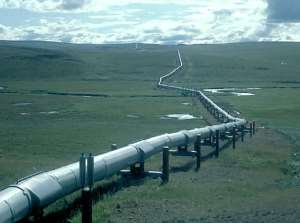
Illegal connections on the Tema-Akosombo Petroleum Pipeline (TAPP) of the Bulk Oil Storage and Transportation (BOST) Company Limited have cost the nation GH¢1.5 million in two years, a senior official of BOST has said.
According to the General Manager (Operations) of BOST, Mr Benjamin Arthur, the amount was the value of 780,000 litres of fuel lost as a result of the illegal connections.
In 2010, the company detected that some unscrupulous individuals had drilled holes in its Tema-Akosombo pipeline at remote spots to siphon fuel.
The five illegal connections were repaired, but towards the end of 2012, BOST, with the help of a military patrol team, detected two more illegal connections.
To check the illegal connections, the military team now conducts constant surveillance on the 61-kilometre pipeline that transmits petroleum products to Akosombo and further to the northern part of the country.
Mr Arthur explained that the illegal installation had meant that BOST now transported products on trucks to Akosombo to be barged to Buipe in the north, which cost the company more.
“It cost GH¢25,000 to transmit products through the pipeline. However, under the current situation where we are forced to transport by trucks, BOST spends GH¢200,000 to transport the same amount of products,” he said.
The perpetrators drill holes on the six-inch diameter pipeline and use brackets to hold a valve in place, after which they connect galvanised pipes to the brackets hundreds of metres across the pipeline's right of way where they load onto tankers.
The illegal exercise, which seems to be the handiwork of experts in the oil sector, cost the country several millions of cedis both in product loss, repair and alternative transportation.
The TAPP was constructed in 1994 to transmit petroleum products from the Accra Plains Depot of BOST in Tema to Akosombo through the Mami Water Depot. On arrival at Akosombo, the products are loaded onto river barges on the Volta Lake and transported to the Buipe Depot, from where they are distributed throughout the northern sector and parts of the Brong Ahafo Region.
The petroleum pipeline is germane to the country's strategy to export fuel products to neighbouring countries such as Burkina Faso when the country starts exporting refined petroleum products.
BOST sought the assistance of National Security to patrol the 61-kilometre pipeline to discourage thieves from siphoning oil from the pipeline, which happens when the petroleum transporting company pumps products at high pressure.
National Security, in turn, detailed armed military men who now patrol the lines regularly. Although no arrests have been made, the presence of the soldiers has brought the situation under control.
When patrols started last October, BOST estimated that it could save up to GH¢475,753 a month.
The Director of Public Relations of the Ghana Armed Forces, Col Mbawine Atintande, explained that National Security detected the two additional siphoning points when its officials started the surveillance in October 2012.
He called on the communities along the pipeline to contribute their quota to the exercise by giving tip-offs and reporting any suspicious movement of tankers to the police.
He warned the perpetrators to stay off because “the patrol team is armed and can engage when necessary”, adding that “the soldiers are ready to fire at anybody seen siphoning products”.
Col Atintande said the patrol was effective and was going to ensure there were no more punctures on the lines, adding that the Air Force had also been doing aerial surveillance as part of its routine patrols on national installations such as electrical pylons and pipelines.




 Western North been sidelined for far too long; address our needs before 2024 ele...
Western North been sidelined for far too long; address our needs before 2024 ele...
 Effutu: 'Stop eating at night and take care of your health' — Afenyo Markin advi...
Effutu: 'Stop eating at night and take care of your health' — Afenyo Markin advi...
 Akufo-Addo's desperate attempt to disrupt Yagbonwura's 1st year anniversary cele...
Akufo-Addo's desperate attempt to disrupt Yagbonwura's 1st year anniversary cele...
 Armed robbers attack, rob Sethi Brothers Ghana Limited in Tema
Armed robbers attack, rob Sethi Brothers Ghana Limited in Tema
 SML deal: We commend Manasseh for holding gov't to account, Akufo-Addo for not s...
SML deal: We commend Manasseh for holding gov't to account, Akufo-Addo for not s...
 Our recall invocation is in good faith to consider three key issues – Majority
Our recall invocation is in good faith to consider three key issues – Majority
 You’re inviting bad luck upon yourself if you use Indian hair — Spiritualist war...
You’re inviting bad luck upon yourself if you use Indian hair — Spiritualist war...
 Ejisu by-election: Police questions Kwadaso MP, two others over bribery allegati...
Ejisu by-election: Police questions Kwadaso MP, two others over bribery allegati...
 Nana Kwame Bediako is Nkrumah’s reincarnate; he’ll be president if he appoints N...
Nana Kwame Bediako is Nkrumah’s reincarnate; he’ll be president if he appoints N...
 Dumsor: Mahama gave us ‘dum, dum, dum’ but we are now in the era of ‘dum sie sie...
Dumsor: Mahama gave us ‘dum, dum, dum’ but we are now in the era of ‘dum sie sie...
